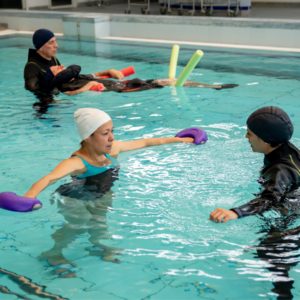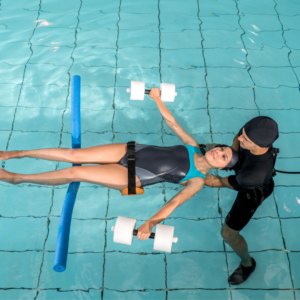Imagine sinking into a warm, bubbling jacuzzi and feeling the soothing jets of water massage your tired muscles. This blissful experience is just a glimpse of the wonders of hydrotherapy. Hydrotherapy is a therapeutic technique that utilizes water in various forms to promote healing and alleviate a wide range of conditions. From reducing pain and inflammation to aiding in rehabilitation, hydrotherapy is a versatile and effective treatment option that can improve your overall well-being.

What is Hydrotherapy?
Hydrotherapy is a form of therapy that involves the use of water for various healing purposes. It has been used for centuries as a natural and gentle way to promote wellness, alleviate pain, and aid in the treatment of various medical conditions. From relieving stress to improving circulation, hydrotherapy offers a wide range of benefits for both the mind and body.
Definition and Overview
Hydrotherapy is a therapeutic technique that utilizes water in its various forms, such as steam, ice, or liquid, to enhance physical well-being. It can be done in different settings, including hot tubs, pools, or even specialized hydrotherapy clinics. The temperature, pressure, and duration of the water treatments depend on the specific condition being treated and the individual’s needs.
History of Hydrotherapy
The origins of hydrotherapy can be traced back to ancient civilizations, such as the Egyptians, Greeks, and Romans, who recognized the healing properties of water. These civilizations used water in baths and thermal springs to promote relaxation, detoxification, and rejuvenation. Over time, hydrotherapy techniques and practices have evolved, and today, it is a recognized and widely used therapeutic approach in modern medicine.
Conditions Treated by Hydrotherapy
Hydrotherapy offers a vast array of benefits and can be beneficial in treating a wide range of conditions. Below are some of the most common conditions that can be effectively addressed through hydrotherapy:
Musculoskeletal Conditions
Hydrotherapy is highly beneficial for individuals with musculoskeletal conditions, such as arthritis, joint pain, and muscle strains. The warm water helps to relax muscles, reduce inflammation, and improve flexibility and range of motion. Additionally, water buoyancy reduces the effects of gravity, allowing individuals with limited mobility to exercise and strengthen their muscles without placing excessive stress on their joints.
Respiratory Conditions
Individuals with respiratory conditions, such as asthma, chronic bronchitis, or sinusitis, may find relief through hydrotherapy. Steam inhalation and nasal irrigation with saline solutions can help clear congestion, reduce inflammation, and promote better breathing. Hot showers or baths can also help to relax the muscles in the chest, improving the overall respiratory function.
Neurological Conditions
Hydrotherapy has shown promising results in the treatment of various neurological conditions like multiple sclerosis, Parkinson’s disease, and stroke. The water’s buoyancy reduces the pressure on the joints and muscles, allowing individuals to move more freely and improve balance and coordination. Furthermore, hydrotherapy can stimulate the release of endorphins, natural pain-relieving compounds that can alleviate symptoms and improve mental well-being.
Cardiovascular Conditions
Individuals with cardiovascular conditions, such as high blood pressure, heart disease, or circulatory disorders, can benefit from hydrotherapy. The warm water temperatures can help dilate blood vessels, improving blood flow and reducing blood pressure. Water exercises, such as swimming or water aerobics, provide a low-impact cardiovascular workout that strengthens the heart and improves overall cardiovascular health.
Digestive Disorders
Hydrotherapy can offer relief for individuals suffering from digestive disorders, such as irritable bowel syndrome (IBS) or constipation. Alternating warm and cold water applications, such as hot and cold compresses or sitz baths, can help stimulate the digestive system, improve bowel movements, and reduce abdominal discomfort. Additionally, hydrotherapy can promote relaxation, which can aid in stress reduction, further benefiting the digestive system.
Skin Conditions
Skin conditions like eczema, psoriasis, or acne can benefit from hydrotherapy treatments. Soaking in warm water promotes better blood circulation to the skin, aiding in the delivery of nutrients and removing waste products. Additionally, hydrotherapy can help hydrate the skin, reduce inflammation, and alleviate itching or irritation commonly associated with these conditions.
Stress and Anxiety
Hydrotherapy is a fantastic way to relax, de-stress, and relieve anxiety. The warm water, combined with the soothing hydrostatic pressure, promotes relaxation and can help reduce tension in both the body and mind. The release of endorphins during hydrotherapy also contributes to an improved mood, reduced stress levels, and an overall sense of well-being.
Post-Operative Rehabilitation
Hydrotherapy is commonly used in post-operative rehabilitation to aid in the recovery process. The buoyancy of water reduces stress on healing wounds and joints, allowing for gentle movement and exercises. Hydrotherapy can help alleviate pain, improve range of motion, promote tissue healing, and expedite the overall recovery process.
Sports Injuries
Hydrotherapy is a popular treatment option for sports-related injuries due to its ability to provide both therapeutic and rehabilitative benefits. The buoyancy of water allows athletes to exercise and rehabilitate without putting undue stress on injured joints or muscles. Water resistance can also be utilized to strengthen muscles and improve overall fitness in a safe and controlled environment.
Pregnancy and Women’s Health
Hydrotherapy can be particularly beneficial for pregnant women, offering relief from the physical discomforts associated with pregnancy. Immersion in warm water can alleviate back pain, swelling, and reduce stress on joints and muscles. It can also provide a calming and soothing environment, promoting relaxation during pregnancy. Additionally, hydrotherapy can assist in various women’s health issues, such as menstrual pain or menopausal symptoms.
In conclusion, hydrotherapy is a versatile and effective therapeutic approach that addresses a wide spectrum of conditions. From musculoskeletal disorders to stress and anxiety, hydrotherapy provides a gentle and natural way to promote well-being and improve quality of life. With its rich history and numerous benefits, hydrotherapy continues to be a valuable resource in modern medicine.



